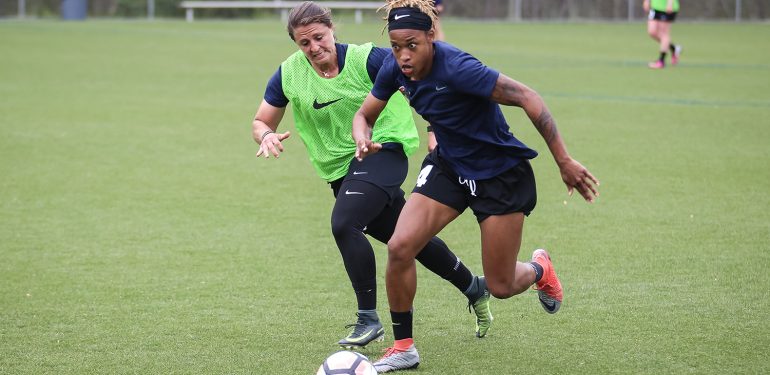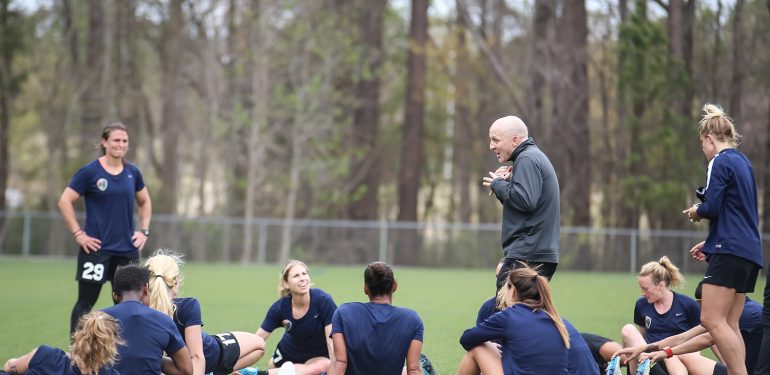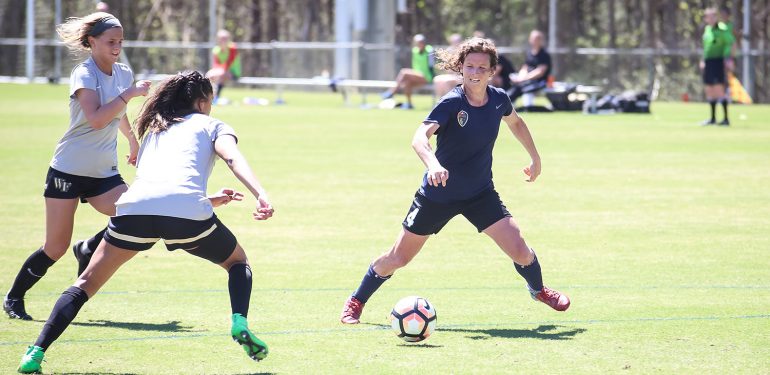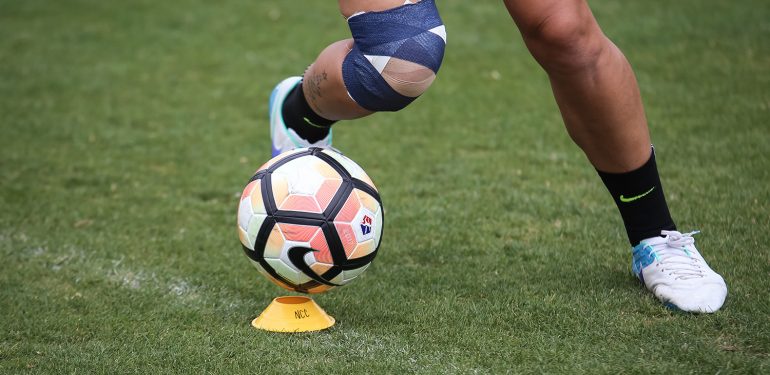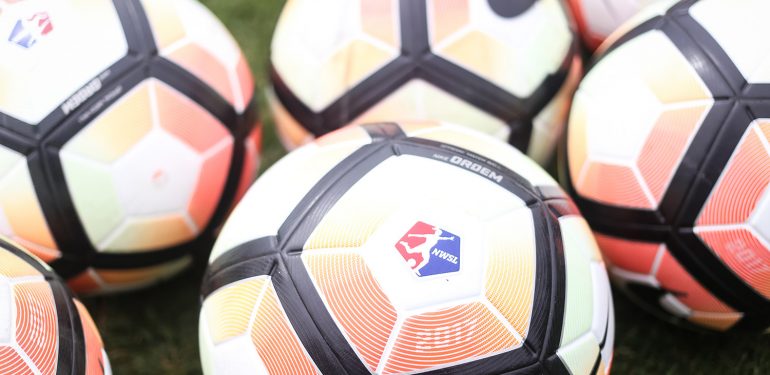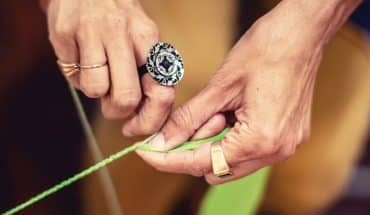
The starting eleven players before a pre-season scrimmage for the North Carolina Courage against Wake Forest University on Saturday, April 1, 2017.
Profile in {NC} Courage
by Liza Roberts
photographs by Ray Black III
It’s a late March afternoon at WakeMed Soccer Park in Cary, where 25 professional soccer recruits are gutting it out on a secluded practice field behind the stadium.
These players – some of the best athletes in the world – have a lot on the line. They’ve survived a first cut from an initial list of 30. They have less than two weeks before a final 20-player roster will be announced. It’s their second practice of the day. And everything they’re doing is new.
They’re creating a new team for a new organization in a league that’s only five years old. They’ve moved to a far-away, new place to do it. And they’re a new kind of professional player for these fields: They’re women.
With fuel-injected speed, precision skills, and athletic grace, they tackle their practice scrimmage like they take nothing for granted. None want to miss a chance to suit up for the North Carolina Courage’s inaugural National Women’s Soccer League season, just a few weeks away. All want to be prepared once they get there.
Team owner Stephen Malik compares them to the NFL players of the 1920s, pioneering athletes who built a sport from the ground up not for dollars or fame but “for the love of the game.”
That’s clear. They’re willing to give a practice all they’ve got, even though the core of the squad on the field ranks as national champions already. They secured that title last year in their previous incarnation in the National Women’s Soccer League as the Western New York Flash. Some also represent the best of their native countries, playing for the national teams of Brazil, Japan, New Zealand, Canada, and the U.S.
Maybe it’s that earned confidence that frees them up to smile, joke, and laugh as they do their precision drills; why they’re loose and chatty as they sprint and kick. A possession drill is underway: They need to complete eight passes before shooting. Coach Paul Riley counts their passes and shouts instructions and encouragement as they go: “Five passes, guys, come on … play it, play it, OK! Great football!” Then: “Everybody down!” The women drop to the grass and deliver 25 sets of push-ups and crunches with gusto – and more laughter.
“They have a lot more fun in training than the men,” says Marco Rosa, director of communications for the North Carolina Courage and the North Carolina Football Club, who watches from the sidelines. “The vibe is different. It’s joyful, almost. Happy.”
Also happy: Malik, the team owner and local entrepreneur who also owns North Carolina F.C. (the North American Soccer League men’s team formerly known as the Carolina RailHawks) and sits on the board of the U.S. Soccer Federation. His goal of building world-class soccer in the Triangle got a major boost when he bought the Flash and brought them here in January; the announcement came just one month after he renamed the RailHawks, put in a bid for a Major League Soccer franchise, and said he’d build a new 24,000 seat stadium to hold it all. He started pursuing a women’s NWSL team at the same time but wasn’t expecting it to come together so quickly. When he realized the Flash was “a perfect fit for our area,” he sped things up.
“Not only are they the champions,” he says, “but they’re young. They have a lot of soccer ahead of them.” His vision for the team is bold: “I think we can be the best women’s team in the world, and I’m not so sure we aren’t already.”
Malik’s counting on fans to agree. In another strategic move, he announced a partnership in March with two youth leagues, the massive Capital Area Soccer League and the Triangle Futbol Club Alliance, creating the largest youth-to-pro soccer club in the country. “Now we have 14,000 youth playing with us,” he says. “And half of them are young women. To be able to offer those girls a chance to see some of the best women players in the world…” And, for a few, the chance to train with those players. In April, the club announced a girls’ development academy similar to the NCFC’s existing boys’ development academy. It will begin competing in the fall.
Sportsmanship, fellowship
The Courage development academy will undoubtedly teach girls skills and stamina. But if these professional players – and their coach – are also able to pass on some of their sportsmanship, they just might be able to create another generation of world-class stars.
Ask a Courage player what she likes about soccer, and she’ll tell you about the team: why the players like each other, what motivates them, and why they respect their coach, who also led the Flash.
“We take it day in, day out,” says Jessica McDonald, a 6-foot-tall forward who was a starter and top assister for the Flash last year and helped win the 2008 national championship when she played at UNC-Chapel Hill. As she cools down from the two-hour practice, she doesn’t hesitate to zero in: “We encourage each other.” Captain Abby Erceg, a defender who also serves as captain for the New Zealand national team and was captain for the Flash, says the squad is unusually tight-knit. “I’ve played on a lot of teams around the world, and this is more like a family,” she says; her teammates nod. “It’s good for the game.” She credits coach Paul Riley for providing the glue. “He’s done a really good job of bringing the girls together. He’s included us in the process, and he’s instilled a lot of confidence in the players.”
Goalkeeper Sabrina D’Angelo – a member of the Canadian women’s national soccer team, an Olympic bronze medalist, and a former star at the University of South Carolina – agrees. “We’re lucky to be with Paul,” she says. McDonald sums it up: “He opens our eyes, and takes us to a place we didn’t think we could be.”
The visionary coach is modest. “It’s just about the process, about the journey,” Riley says, smiling, low-key. “We spend a lot of time talking about the mental part of the game. And it’s fun if you work hard. It pays off at game time. Our mantra is ‘stay the course’ … We just try to have as much fun as we can.”

